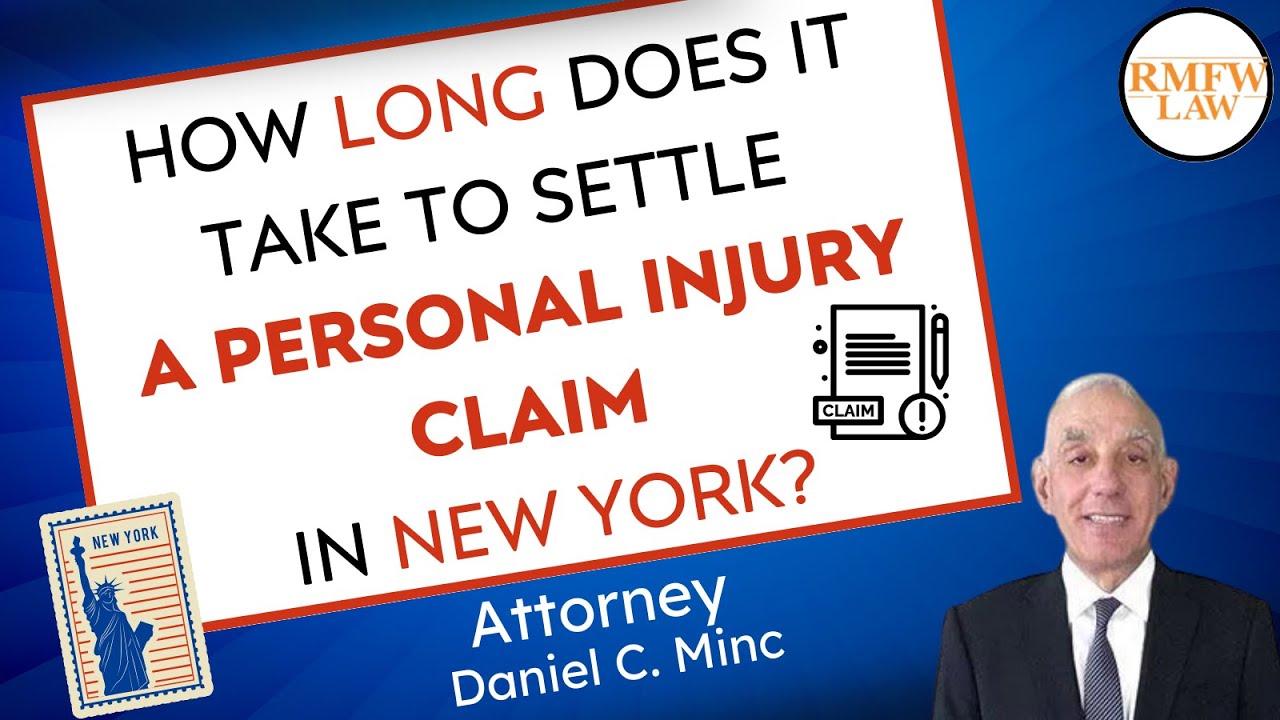
The question that is at the back of the minds of most accident victims pursuing a personal injury claim is: how long will my lawsuit take? They often ponder whether it is worthwhile to seek compensation for their injuries, especially when the whole labyrinthine process is moving at a snail’s pace and the medical bills are piling up.

The question that is at the back of the minds of most accident victims pursuing a personal injury claim is: how long will my lawsuit take? They often ponder whether it is worthwhile to seek compensation for their injuries, especially when the whole labyrinthine process is moving at a snail’s pace and the medical bills are piling up.
While the circumstances surrounding each personal injury case in New York may be different, making it impossible to predict the time needed for its resolution, it typically takes between one to three years to negotiate a settlement or obtain a verdict in personal injury litigation.
Here are some of the findings from studies conducted by the United States Department of Justice and the National Center for State Courts:
- The time taken for tort trials, on average, from the date of filing a lawsuit to the date of receiving a verdict, was 25.6 months.
- The longest processing time was taken up by product liability trials (35.1 months, on average), and medical malpractice cases (33.2 months).
- Most of the tort cases reach a resolution before the trial stage, and only about 3 percent go on to receive a bench trial verdict.
Personal Injury Claim Process
A number of factors affect the duration of a personal injury case settlement or litigation. Let us take a brief look at each step of the litigation process, the average time taken by each step, and the factors instrumental in speeding up or slowing down the entire process.
Hiring an Attorney
If you have sustained personal injuries and suffered other damages in an accident due to someone else’s negligence or wrongdoing, we recommend engaging an experienced personal injury lawyer to handle your compensation claim. Most personal injury attorneys do not charge a fee for initial consultations.
However, you need to keep in mind that lawyers are busy, so they may not be available as soon as you reach out. It may also take you a while to identify the right attorney for you. Given these reasons, you must start the process of hiring a lawyer as soon as possible.
Initiating a Personal Injury Case
The first steps your lawyer needs to take in order to initiate an official civil lawsuit, include:
- File a complaint setting forth the details of your case and the compensation amount you are demanding, in the appropriate court, along with the accompanying filing fee.
- Serve the negligent party with summons notifying them that you are using them, and a copy of the complaint.
Once your lawyer agrees to represent you, they need to determine the relevant statute of limitations. The statute of limitations stipulates the amount of time you have as a plaintiff to file a lawsuit.
The statute of limitations is different in each state but is typically between one to three years. Keeping this in mind, your attorney will draft the complaint which might take anywhere from one week to one year, to draft and serve, depending upon some of these factors:
- How complex is the case? For instance, how many defendants are included in the complaint?
- Is your lawyer willing to negotiate before filing the complaint?
- Are the defendants making attempts to evade service of summons, or cannot be located?
Discovery Process
The parties to a lawsuit exchange information in a pre-trial process called discovery. The information exchanged typically includes:
- Police reports
- Medical records
- Company emails
- Security footage
Depositions, which provide both parties with opportunities to question each other and cross-examine witnesses, are also a part of the discovery process. These depositions require the presence of a court reporter to keep a written record of all the testimonies.
The process of discovery generally begins immediately after the filing of the complaint and typically continues until roughly 30 days before the beginning of the personal injury trial.
Court Motions
The lawyers from both sides file pre-trial motions, requesting the court’s ruling on specific issues, ranging from discoverable documents to proper venue. Pre-trial court motions can be filed soon after filing of the complaint and generally continue until the start of the trial.
Some of these motions may consume more time than others, depending upon their impact on the ongoing case. For instance, a motion asking for dismissal of the case will take longer to hear than a motion urging the other party’s lawyer to turn over a particular piece of evidence.
Negotiating a Settlement
An overwhelming majority of personal injury compensation claims are settled before going to trial. Your attorney may initiate settlement negotiations immediately after the initial discovery. While the settlement can be informally discussed between the attorneys of both sides, they can also make a formal route through the process of mediation or arbitration.
Even if your attorney carries out informal settlement negotiations, your approval in rejecting or agreeing to a settlement offer is a must. Settlement negotiations can sometimes be protracted, and it is quite common for a personal injury case to settle just before the start of the trial.
Going to Trial
If the settlement negotiations break down in your case, it will go to a civil trial where a judge or jury will examine the evidence and give their judgment on whether the defendant or their insurance company is legally liable to pay compensation to the plaintiff. These are the typical stages of a civil trial:
- Jury selection
- Opening arguments
- Cross-examination of witnesses
- Closing statements
- Jury instruction
- Jury deliberation and verdict (pronounced by a judge in case of a bench trial)
It is not uncommon for the court to push back trial dates several times over the course of a civil trial. This can also provide the parties more time to work out a settlement in the case.
Appealing the Verdict
If either the defendant or the plaintiff disagrees with the court verdict, they have the right to appeal. The aggrieved party has 30 days to file an appeal after the court verdict. In case of a successful appeal, the court may allow a new trial or settlement in your NYC personal injury case.
When to Sign the Settlement Release Agreement?
Negotiations can be arduous and demanding, but you need to hold your nerve and remain unruffled, ensuring that the proposed compensation offer accommodates your needs and meets your expectations. Make sure of the following, before you sign the settlement release agreement:
- The compensation offered is sufficient to cover your medical bills, lost earnings, and pain and suffering.
- All future medical expenses, if needed, are also covered.
- You clearly understand the areas and terms covered under the agreement, such as personal injury expenses and property damage.
Carefully review the settlement agreement and release, to ensure that it is commensurate with your verbal agreement. The settlement release agreement is a legal contract, and you must exercise your legal right to consult an attorney before signing the document.
Having signed the release agreement, you will not be able to seek or recover any further damages. Once you have signed the settlement agreement, send a written confirmation mentioning the amount and terms of the agreement, to the insurance company adjuster.
Factors Affecting the Settlement Timeline
Some of the prominent factors that may potentially have a bearing on the time it takes to settle a personal injury claim in New York are:
Circumstances of the Case
Some personal injury claims, like a slip and fall or a rear-end collision, are relatively uncomplicated. In these claims, the evidence is mostly straightforward and indisputable, leading to a quick and easy settlement.
However, a medical malpractice claim can be more intricate and complex. These types of cases may involve protracted discovery hearings and reports from medical experts or financial specialists.
Amount of Compensation
A $1,000 personal injury claim has much more chances of a quick resolution than a case worth $1 million. Larger cases involving a higher claim will likely see the insurance company trying to stall or delay settlement negotiations, to avoid paying until the scheduled trial dates. An injured party has more leverage as the trial date looms closer.
Nature and Extent of Injuries
Typically, a personal injury claim involving a mild injury like a sprained wrist will have a quick resolution than a case involving a traumatic brain injury or death. Claims for injuries that are not significantly disabling resolve faster than claims involving more grievous injuries.
Slower recovery time in severe injuries necessitates a long-term prognosis. The injured victim may need to be off work for two or more years before a medical expert can certify their disability.
Court Caseload
Court dates, the backlog of cases in your jurisdiction, and the availability of judges; all play a role in how long your personal injury claim takes.
Patience and Perseverance
If you are keen to settle quickly, your case may reach a faster resolution. On the other hand, if you can hold out longer, you may end up with a bigger settlement amount, but your case may take longer.
Contact Rosenberg, Minc, Falkoff & Wolff, LLP for Help with Your NY Personal Injury Claim
Insurance companies, in their bid for quick resolution of the case, often offer low settlements, limiting how much you could actually receive if represented by a seasoned and competent personal injury attorney. While a quick settlement is not the most desirable outcome, some trials may drag out too long.
At Rosenberg, Minc, Falkoff & Wolff, we make it our job to keep our client’s long-term interest in mind, while moving cases quickly. If you or a loved one has suffered injuries in an accident in New York, contact us to discuss the options you have to pursue compensation. Call our personal injury law firm at 212-344-1000 or contact us online for a free case evaluation, and our lawyers will get back to you right away.


